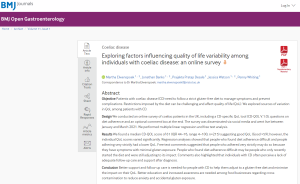Quality of life lower for people with coeliac disease who find it hard to follow a gluten-free diet
15 July 2024
People with coeliac disease who find it hard to follow a gluten-free diet and those who are very strict about following it have a lower quality of life, according to research published in BMJ Open Gastroenterology. Results also highlighted that those living with the condition often perceive a lack of adequate follow-up care and support after diagnosis.
Coeliac disease is a chronic autoimmune disorder, which damages a person’s intestines when they eat products containing gluten. Researchers from ARC West and the University of Bristol conducted an online survey about quality of life among people diagnosed with the condition.
Researchers developed survey questions in collaboration with GPs, gastroenterologists, and patient representatives with additional space for free-text comments also being provided. These comments suggested that people who adhere very strictly to a gluten-free diet may do so because they experience symptoms with minimal gluten exposure. On the other hand, people who found following a diet difficult may only recently have started following it and were still adjusting to its impact.
Untreated coeliac disease can lead to serious complications, such as osteoporosis, anaemia, malnutrition, cancers, and premature death. There is no cure but most patients can manage their symptoms by following a gluten-free diet. The diet is restrictive and involves cutting out a lot of ‘everyday’ items such as bread, pasta, biscuits, pastries and soups (unless there are gluten-free options available).
Dr Martha Elwenspoek, lead author said:
“Our survey showed that some people experienced coeliac disease and the associated diet as a heavy burden. Patients who worried about their health were concerned about the consequences of a late diagnosis. This suggests that delays in getting a diagnosis are associated with lower quality of life.
“Some people found a gluten-free diet very limiting and struggled to adjust to it. However, others were quite positive about it and were happy that their symptoms could be managed by something as simple as dietary changes. Nevertheless, people struggled with the lack of awareness among friends and family, healthcare professionals, and hospitality staff and were unsatisfied with the availability and costs of gluten-free products.
“Our study highlighted the substantial treatment burden imposed by a strict and lifelong gluten-free diet. Anxiety and depression, which are common among people with coeliac disease, can further affect their quality of life and their likelihood of following the diet. This raises the importance of being able to provide psychological support after diagnosis.
“However, in line with previous research, our study highlights the challenge of consistent follow-up care for individuals with coeliac disease. While regular follow-up is considered a vital component of patient care, in practice, follow-up care is often inconsistent or absent.”
Paper




